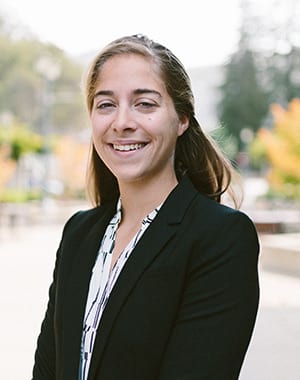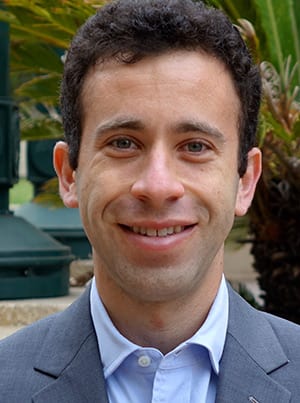By Andrew Cohen
One of the groups most vulnerable to COVID-19 is largely invisible to society: children in federal immigration detention facilities. For three Berkeley Law graduates working at the National Center for Youth Law (NCYL), shining a light on their situation recently led to a major court triumph.

Neha Desai ’06, Melissa Adamson ’17, and Matthew Bedrick ’19 played key roles in gaining emergency relief for children in federal immigration custody. U.S. District Court Judge Dolly Gee ordered the release of detained minors to suitable family members and sponsors without unnecessary delay, and required that children without vetted sponsors be transferred to a setting that complies with COVID-19 guidelines set by the Centers for Disease Control and Prevention.
The ruling also waived certain fingerprinting requirements, which often delay children’s release to family members and vetted sponsors, as many of fingerprinting offices are closed due to the pandemic.
“Soon after we filed our temporary restraining order, staff members and children in multiple facilities throughout the country tested positive for COVID-19,” says Desai, NCYL’s immigration director. “One medical professional described the prospect of not removing detained youth as ‘leaving them in a burning house.’”
Most of the detained children are in custody of the Office of Refugee Resettlement (ORR), which confines youth who came to the U.S. without a parent or legal guardian. Many live in facilities where they eat and sleep in close proximity and cannot practice social distancing or other measures to avoid contracting COVID-19. As of mid-May, ORR reported that 68 children in its custody as well as 138 staff members and care providers had tested positive.
Working with two partner organizations, NCYL engaged in weeks of litigation to expedite the release of detained children by enforcing the 1997 Flores Settlement Agreement. It stems from a case in which 15-year-old Jenny Flores fled El Salvador’s civil war and was held in a motel the U.S. government used as a makeshift detention facility with other children—who had no visits with family and friends, education opportunities, or recreation—and adults they did not know.
The agreement sets national standards for the detention, treatment, and release of all minors in federal government custody.
NCYL and Flores co-counsel have filed multiple motions over the years to enforce the agreement, which remains under Gee’s supervision. Finding that ORR and Immigration and Customs Enforcement (ICE) violated the agreement for unnecessarily delaying the children’s release amid COVID-19, Gee wrote, “Under the current extraordinary circumstances in the midst of a pandemic, ORR’s obligation … requires moving with greater speed to remove minors from congregate environments where a suitable custodian exists.”
Adamson notes, “We hope that Judge Gee’s order ensures that ORR releases children that would not have otherwise been released for a long time, or at all.”
Next steps
The court will monitor its order through status conference hearings and monthly reports by ICE and ORR juvenile coordinators.

“These reports must detail the government’s compliance with CDC COVID-19 recommendations, measures taken to expedite children’s release, data regarding children experiencing delays in release, and data regarding facilities with confirmed COVID-19 cases,” Desai says. “They also require a timeline for medical assessments if a child has been exposed to COVID-19, plans to identify and protect children at higher risk of serious illness from COVID-19, and individualized assessments of children subject to removal orders.”
The Flores Agreement requires the federal government, including ORR and ICE, to make “prompt and continuous efforts” toward family reunification and to release children “without unnecessary delay” to vetted sponsors.
“A well-established body of research has shown that detaining children interferes with healthy development, exposes youth to abuse, undermines educational attainment, exacerbates pre-existing mental health conditions, and puts children at greater risk of self-harm,” Adamson says.
Enhanced immigration enforcement and anti-immigrant rhetoric has made potential sponsors fearful of coming forward to take care of detained children, leaving more of them indefinitely in ORR custody. ORR shares sponsor information and fingerprints with ICE, which has arrested at least 170 people who came forward to sponsor children.
Over the past few years, both the number of children in federal custody and the length of their detention have fluctuated dramatically in response to federal policy changes.
A close-up view
Desai, Adamson, and Bedrick are among NCYL’s lawyers who visited with detained immigrant children across the country before COVID-19 emerged.
An Equal Justice Works Fellow sponsored by Cooley LLP, Bedrick clerked at NCYL after his 2L year. He helped design a fellowship project to ensure that immigrant children in federal detention get the education services to which they are entitled and that recently released children receive services they need to succeed in public schools.

“I served on the team with Neha and Melissa that filed a motion to enforce the Flores Settlement Agreement and filed complementary litigation to protect immigrant children’s rights and reunite them with their families,” Bedrick says. “It was an amazing opportunity to learn from the dedicated and skilled attorneys on my team and to make a positive impact for detained immigrant children.”
Earlier this year, he interviewed a Flores class member who fled his country of origin because a gang had threatened him and his family. After being placed in a secure detention facility, where Bedrick says the client was prescribed psychotropic medication and verbally abused by guards, NCYL and co-counsel’s advocacy helped the youth transfer to a safer, less restrictive facility.
“During the interview, it was powerful to witness this young man’s resilience and hope,” Bedrick says. “I left feeling energized to keep fighting for all of our class members to be released from detention to communities where they can heal and move forward.”
Often during her interviews with detained children, Adamson hears them convey anxiety, fear, and despair at being detained and kept apart from their families or potential caregivers. But she also hears strength in their words.
“I always ask the children what they want to be when they grow up, and it’s striking how many of them say that they want to be immigration lawyers,” Adamson says. “These children recognize that their attorneys are trying their best to help them, and they want to do the same for other children.”